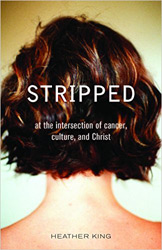Let’s make one thing clear up front: I am drawing here on my experience as an avid memoir reader, not as a memoir writer. I have one book to my name, and while it is partly a memoir and was well-reviewed, having written one memoir does not make me an expert in writing memoir. But I think I can reasonably claim expertise in reading memoir. Memoir has always been a favorite genre, and most of the books that I review for Patheos book clubs and the Englewood Review of Books are memoirs. These are three problems I’ve noticed in many memoirs. I offer these as a reminder to other memoir writers out there, but also to myself, because I’ve made some of these mistakes too.
Memoir Mistake #1: Writing About Writing Your Book…In Your Book
I’ve read several memoirs recently that have incorporated their publishing story—how the memoir I am reading went from being lived, perhaps to a blog or published essay, and then to the actual book I hold in my hands—into their memoir. The experience of writing a memoir can be interesting reading in the right context, but it does not belong in the memoir itself.

The thrill of a great story is that it pulls readers into your world, where we become immersed in your words and experiences. When you start telling us about how your story got published, you yank us out of that immersive experience. Reading about how your story became a book reminds us that you’re just another regular schmo tapping away at your laptop in your yoga pants, when you want us to keep thinking of you as a wisecracking, deep-thinking, beaten-down-but-somehow-still-hopeful survivor who spun your story into literary gold. Compared with whatever your primary story is, your publishing story is boring. Including your publishing story can also come across as self-serving and self-justifying: “Look!”, you seem to be saying, “I wasn’t even sure this book was any good until this kinda famous writer who read my viral blog post sent me an email offering to introduce me to her agent! So obviously, it’s really good!”
The Internet has fueled a mini-industry of writers (and editors and agents and publicists) pulling back the veil on the processes of writing and publishing. Never have writers, readers, and publishing professionals had more access to snapshots of how writers write and how we make that coveted leap from aspiring writer to published writer. Reading about other people’s experiences with writing and publishing is both educational and kind of fun—in the proper context. The acknowledgements are a great place to tell the short version of your publishing story, as you thank your husband’s coworker, who told her editor brother-in-law about your idea, who then told his agent friend, who surprised you with a call one otherwise normal Tuesday morning. You can also tell your publishing story on your blog or web site, where your most avid fans will love it and ask for more.
Memoir Mistake #2: Assuming that a Really Intriguing Story Makes for a Really Intriguing Book
One thing makes a great memoir: Great writing. A superb memoirist can take even a relatively mundane story and make it into a laughter and/or tear inducing masterpiece (e.g., A Girl Named Zippy by Haven Kimmel). A superb memoirist can take an unusual or idiosyncratic experience and write about it with such skill that readers—even readers who have no comparable experiences—feel that the writer is speaking directly to or about them. For example, in Autobiography of a Face, Lucy Grealy writes about the experience of chronic illness and disability in a way that moves readers to think more deeply about their own bodies and lives, even if they have no experience of chronic illness or disability. The story that Jeannette Walls tells in The Glass Castle is very strange, but the strange story is only part of what draws readers to this book. Walls tells her bizarre story in a way that invites readers to ponder more universal experiences, such as our capacity to forgive parents even when they do terrible things, or why children from the same dysfunctional family can end up in such different places as adults.
In contrast, I have picked up memoirs because I was intrigued by the unusual story they promised to tell, and then stopped reading two-thirds of the way through. Even though I hadn’t yet learned whether the brother was going to be acquitted of the murder charge, or whether the abandoned child would ever find her long-lost mother, I stopped reading because the writing was so bland that even plots featuring violent crimes, whirlwind romances, and wayward orphans were rendered dull and plodding.
You may have an incredible story to tell, but what makes an incredible book is top-notch writing. If you don’t think you have the writing skills to transform your story into a page-turner, then find an experienced writer with whom you can collaborate. Any story can be compulsively readable if well told, and any story can be mind-numbingly boring if poorly told.
Memoir Mistake #3: Being Unaware of Other Books on the Same (or Similar) Topic
One of the first steps in sketching out a memoir idea should be to read as many books, essays, and articles as possible written on the same or a similar topic, by others who have had similar experiences to the ones you plan to write about. This research will help with the section of your book proposal known as the “Comparative Analysis,” in which you discuss other books on your topic and why your book will stand out. But this research will also make your book a better book, because it will set your memoir apart from other, similar memoirs, and it will impress reviewers.
I read a lot of parenting memoirs, and my chief complaint about 95 percent of them is that they are derivative. Even if a parenting memoir is witty and well-written, if it reminds me of most of the other parenting memoirs I’ve ever read and fails to offer anything unique (an unusual story twist, a captivating authorial voice), I’m not impressed. This is true with other types of memoirs as well. Let’s face it: Very few of us have life stories that are truly unique. What makes a memoir stand out isn’t a wildly strange story (see point #2, above) but a wildly wonderful writer who knows that other people have written similar stories, and written them well, and who sets out to do something new and different with the same old story. You won’t know how to make your work stand out if you don’t first familiarize yourself with what others have written.
Your publicist or marketing manager is going to call on those with some expertise in your memoir’s core topic to provide back-cover blurbs and write reviews. A memoir that centers on addiction, for example, will be reviewed by others with some experience of or expertise in addiction. Reading and taking notes on some well-known books on addiction will at least ensure that you don’t come across as ignorant when one of these experts reviews your book. If you go a a few steps further and incorporate your observations and reactions to other authors’ work in your own book, your memoir will have depth and nuance that readers and reviewers will notice.
Because I write so much about reproductive technologies and disability, I frequently review books that touch on these topics. And I can tell within a few chapters whether or not the author is at all familiar with current issues and controversies related to these topics. I notice a subtle self-congratulatory tone when the author makes an observation that s/he clearly thinks is unique and earth-shattering, but that I recognize as common and shallow. I become frustrated when the author treats complex subjects superficially, making it clear that they know very little about the topic. You don’t have to become an expert on every complex topic you cover in your memoir, but you also don’t want to come across as naive and self-absorbed to reviewers who know more than you do.
Perhaps most important, reading other books written on your core topic will remind you that what makes a memoir great isn’t the story but its telling. As you read other people’s work, you will likely discover that your story isn’t as unique or unusual as you thought it was. But that doesn’t matter if you tell your story in captivating language that keeps readers up long past their bedtime, eager to find out what happens next—and if you also do your research, and save the “how I got published story” for the interview that the New York Times will do when your book hits #1 on the best seller list.











